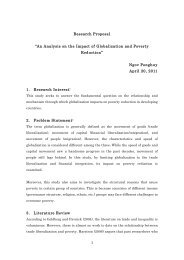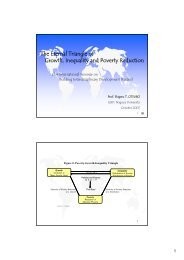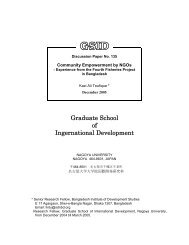Report
Report
Report
You also want an ePaper? Increase the reach of your titles
YUMPU automatically turns print PDFs into web optimized ePapers that Google loves.
142 QUANTIFICATION OF BENEFITS FROM ECONOMIC COOPERATION IN SOUTH ASIA<br />
low literacy level – 42% among those over 15 years.<br />
The Institute of Engineering under the State-funded<br />
Tribhuvan University is recognised as a centre of<br />
excellence by the Asian Institute of Technology (AIT)<br />
in Bangkok. In addition to university courses, various<br />
skill-development courses are run by a number of<br />
private and public institutions under the council for<br />
technical education and vocational training (CTEVT)<br />
in different fields. There is, however, a serious problem<br />
of brain drain, as highly qualified people do not find<br />
enough opportunities in a small and sluggish economy.<br />
This seems to be largely because of the mismatch in<br />
the kind of requirement of qualified people and what<br />
the education system produces because the most<br />
common concern of potential foreign investors in the<br />
Nepali information technology (IT) and telecom sector<br />
has been the lack of skilled manpower (UNCTAD-ICC<br />
2003:52).<br />
The surprising reality is that about 4,000 IT<br />
workers are trained every year in Kathmandu alone.<br />
This number is attributed to the presence of training<br />
institutes which include such brands as Informatics,<br />
NIIT, STG, SSi, Pentasoft and APTECH, operating<br />
through branches or franchises. The Government’s<br />
Employment Promotion Council has also started a<br />
programme in cooperation with the private sector to<br />
train 8,500 semi-skilled and skilled, and 500 highlyskilled,<br />
IT workers. In addition, four universities in<br />
Nepal offer bachelor’s degree courses in IT. Their total<br />
annual intake of students is above 3,000 persons<br />
(UNCTAD-ICC 2003). Two universities are also<br />
running master’s degree courses in IT. The Institute of<br />
Engineering under Tribhuvan University offers a twoyear<br />
MSc in Information and Communication<br />
Engineering and has an annual intake of 20 students,<br />
while Kathmandu University has two such courses: MSc<br />
in Communication Engineering (20 students per year)<br />
and ME in information technology (20 students per<br />
year). In addition, the faculty of sciences of Tribhuvan<br />
University offers an MSc in Computer Science and IT<br />
and has an annual intake of 20 students. The IT worker<br />
is available at low cost.<br />
Overall it could be suggested that Nepal should<br />
further remove restrictions in the sector at least at the<br />
regional level. It has strong import interest in education<br />
and South Asian countries could be significant providers<br />
of education services. For import of education all modes<br />
are relevant in the case of Nepal. While via Mode 1<br />
Nepal can have access to affordable education, via<br />
Mode 2 it can send students to South Asian countries.<br />
Likewise, opening of the educational institutions will<br />
have far reaching implications on Nepal’s educational<br />
and economic progress. Indian educational institutions<br />
are already successfully operating in Nepal, the prime<br />
example being a medical college run by the Manipal<br />
University in Pokhara since 1994. The Manipal college<br />
of medical sciences (MCOMS) claims being ranked as<br />
the best college in Nepal. 4 Apart from Nepalese students<br />
there are students from India and many third countries<br />
who are studying in this college. Finally, via Mode 4<br />
Nepal will be able to attract better qualified teachers<br />
from the region.<br />
Summary of Restriction in the Sector<br />
• Foreign equity ceiling of 51% and after April 2009<br />
of 80%<br />
• No sectoral Mode 4 commitments<br />
• Horizontal Mode 4 commitments limited to ICTs<br />
• No national treatment with respect to foreign<br />
exchange provided to foreigners to pay for any<br />
cross-border services.<br />
• A foreign investor reinvesting earnings is required<br />
to obtain the permission of the Department of<br />
Industry<br />
• All foreign investments except financial services<br />
require approval of the Department of Industry<br />
• Incentives and subsidies are available only to<br />
enterprises wholly owned by Nepalese nationals.<br />
Sri Lanka<br />
Sri Lanka has not undertaken any sectoral commitments<br />
in education services. However, its commitments<br />
under Mode 3 in the horizontal section do cover education<br />
services which provide that foreign investment of<br />
up to 40% of equity in a company providing education<br />
services will be automatically approved by BOISL and<br />
foreign investment in excess of 40% (and up to 100%)<br />
will be approved by the BOISL on a case-by-case basis<br />
in consultation with the relevant State Agencies.<br />
Allowing 100% FDI in education services that too<br />
during the Uruguay Round assumes special significance<br />
as it was a rare kind of liberalisation particularly for a<br />
South Asian country.<br />
Nevertheless, as the commitments are in the<br />
horizontal section they raise a number of questions.<br />
Whether the Sri Lankan commitments apply to all five<br />
sub-sectors of the education sector as given in the<br />
4<br />
http://www.manipal.edu/mcoms/aboutus/overview.htm

















